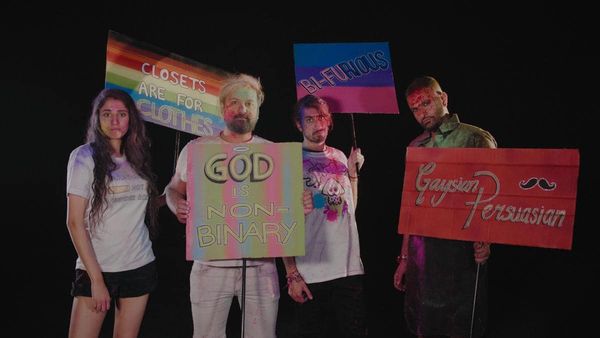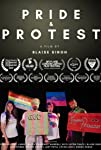Eye For Film >> Movies >> Pride & Protest (2020) Film Review
Pride & Protest
Reviewed by: Jennie Kermode

Although they're facing threats from many quarters at the moment, there's no denying that LGBTQ+ rights in the UK have come a long way in the past few decades. There have been major positive legal changes, from the decriminalisation of sex between men to gender recognition for some trans people and efforts at protection from discrimination. In keeping with this, public attitudes have changed, with most people now much more accepting of difference. Unfortunate, the benefits of cultural change have not been evenly distributed. For many people from black and ethnic minority communities, life is as tough as it ever was.
Part of the problem is that LGBTQ+ people of colour are rarely represented in the media. This helps to perpetuate the myth that they're almost non-existent, depriving isolated, closeted individuals of important role models and stifling wider community conversations. On top if this come the problems caused by prejudices about race and religion within the LGBTQ+ community. Blaise Singh's documentary tackles these problems head on, presenting a challenge to the status quo through its very existence. it reminds us of some of the reasons why Pride is still a protest and it makes room for voices too little heard.
At the core of the film is Rainbow Films, a volunteer-led collective formed in response to protests outside Birmingham primary schools by some Muslims opposed to inclusive education. We open with scenes of the protests themselves, with Glaswegian activist Ferhan Khan present to talk about his own queer Muslim identity and question the protesters about the reasons for their presence. Some, who have perhaps gone along due to peer pressure, seem quite open to discussion, but they're quickly shouted down by one very angry man who is convinced (without really being able to explain why) that the educational curriculum in question is the work of paedophiles. Nevertheless, Khan's presence complicates the wider narrative about the protests, challenging the notion that all Muslims think the same way.
Later material takes in Pride, the importance of Black Pride as a vocally inclusive event, and a project which sees couples kissing on assorted high streets to observe the behaviour of passers-by. Looking directly at the face of prejudice can be hard going, especially for viewers who are themselves part of the affected communities, but it's balanced by the sweetness of the couples involved and the warmth of the wider community, as well as their resoundingly positive attitude and sense that things can change for the better. There are party scenes with fabulous outfits and vibrant concert scenes, a reminder of how important creative work has always been as a rallying point for groups routinely faced with hostility.
Whilst there's a lot here that will improve the understanding of white viewers, this isn't film made for their sake. it speaks first and foremost to the same people it's talking abut, reminding them that they're not alone, that they don't have to choose between their different identities and that they don't have to assess their own value on other people's terms. There's a particularly powerful scene abut the importance of dating other people of colour and resisting the often-internalised idea that dating a white person is more of an achievement because whiteness is held up by wider society as the ideal of beauty. We also see a focus on the importance of having friends who understand what it means to suffer these particular multiple forms of discrimination.
Singh takes into account the ongoing struggles surrounding intersectional identities, with one young man talking about how difficult it is to find a gay community where he doesn't face racism - and then to find one that will be accepting of his bisexuality. Biphobia gets quite a bit of attention, which is pleasing to see given that it's frequently overlooked by other LGBTQ+ documentaries. All in all this is a very well rounded film. Far from the dry, tedious lecture that the anti-woke brigade might imagine, it's a lively, engaging piece of work which puts its points across with real passion. You don't need any special knowledge to watch it and you'll be glad you did.
Reviewed on: 05 Oct 2020















